|
|
|
Sort Order |
|
|
|
Items / Page
|
|
|
|
|
|
|
| Srl | Item |
| 1 |
ID:
134134
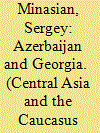

|
|
|
|
|
| Publication |
2014.
|
| Summary/Abstract |
The relations between Georgia and Azerbaijan are a key factor in regional politics and security in the Southern Caucasus. They strongly affect economic contacts and trade, as well as the implementation of all sorts of communication and energy projects. The two countries agree on many issues of regional policy, the way ethnopolitical conflicts should be settled, and the degree to which external actors could or should be involved. Turkey's presence in bilateral Georgian-Azeri relations is another important factor that may end in a geopolitical triangle of sorts in the Southern Caucasus. On the other hand, these relations cannot and should not be described as a formalized full-scale political, let alone, military-political alliance with corresponding mutual obligations. The author discusses these and other aspects of bilateral relations, assesses the prospects for further cooperation, and points to the possible challenges and problems that might crop up later.
|
|
|
|
|
|
|
|
|
|
|
|
|
|
|
|
| 2 |
ID:
133937
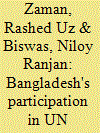

|
|
|
|
|
| Publication |
2014.
|
| Summary/Abstract |
This article argues that the participation of the Bangladeshi armed forces in UN peacekeeping has produced positive benefits for civil-military relations in the country and that this process is best explained by reference to concordance theory, as propagated by Rebecca Schiff. Unlike traditional theories of civil-military relations, concordance theory highlights dialogue, accommodation and shared values or objectives held by the military, the political elites and society. We argue in this paper that peacekeeping has gradually emerged in Bangladesh as an issue where all three partners are converging and prone to hold similar views. This may have a profound impact upon Bangladeshi politics whereby the chances of military intervention in domestic politics will lessen. This paper helps in understanding the implications of Bangladesh's involvement in UN peace missions, an issue on which little work has been conducted until now despite the fact that it has important implications for both the Bangladesh state and its armed forces.
|
|
|
|
|
|
|
|
|
|
|
|
|
|
|
|
| 3 |
ID:
139296
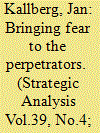

|
|
|
|
|
| Summary/Abstract |
Humanitarian cyber operations would allow democratic states to utilise cyber operations as a humanitarian intervention to capture information and create a foundation for decision making for collective international action supported by humanitarian international law. This follows the legal doctrine of responsibility to protect, which relies first on the nation state itself but when the state fails to protect its citizens, then the international community can act, ignoring the repressive or failed state’s national sovereignty.
|
|
|
|
|
|
|
|
|
|
|
|
|
|
|
|
| 4 |
ID:
137403
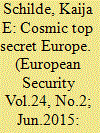

|
|
|
|
|
| Summary/Abstract |
As the EU has expanded its authority into areas of high politics such as monetary, defense, and foreign policy, it has simultaneously developed procedures for handling more sensitive and classified information. These critical policy domains require standards regulating secure information and personnel, but the concept of official secrets is in tension with the treaty norms of the EU. Observers allege that the classified information policy of the EU was imposed through the coercion of external actors such as North Atlantic Treaty Organization (NATO) and the USA in a significant historical departure from the information security policies of European member states. This article evaluates the content of EU-classified information policies and compares them to the content of European member states, NATO, and the USA, in an effort to clarify the mechanisms of policy diffusion in the area of information security.
|
|
|
|
|
|
|
|
|
|
|
|
|
|
|
|
| 5 |
ID:
117044
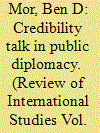

|
|
|
|
|
| Publication |
2012.
|
| Summary/Abstract |
Politics has become a contest of competitive credibility', argued Nye in Soft Power. Indeed, being perceived as honest and reliable is a necessary condition for obtaining and holding the attention of target audiences, as well as for effective persuasion, which is the objective of strategic communication. This task has become all the more difficult with the explosion of information sources and the discreditation efforts of opponents, but it is an essential element in the conduct of public diplomacy. How, then, do states and other international actors go about establishing their credibility while undermining that of opponents? This article employs rhetorical theory, impression management theory, and account theory to situate contests of credibility within the broader context of the accountability of social conduct. The theoretical part discusses the rhetorical strategies that actors use to credit their accounts and discredit those of their rivals. The empirical part addresses the debate between Israel and human rights groups over the Qana bombing incident of July 2006. The analysis of the blame imposition strategies used by Amnesty International and Human Rights Watch and the accounts offered by Israel, indicates the range and variability of credibility talk and the rules for crediting accounts that underlie it.
|
|
|
|
|
|
|
|
|
|
|
|
|
|
|
|
| 6 |
ID:
132710
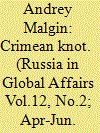

|
|
|
|
|
| Publication |
2014.
|
| Summary/Abstract |
Russia will have to deal with the effects of Crimea being part of an independent Ukraine for 23 years. A Crimean political and business elite has emerged with its own values, bonds, and relationships. Russia is not the motherland of an entire generation of Russian-speaking youth, but the motherland of their ancestors.
|
|
|
|
|
|
|
|
|
|
|
|
|
|
|
|
| 7 |
ID:
137641
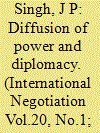

|
|
|
|
|
| Summary/Abstract |
The classic hierarchical distribution of power featuring nation-states is now increasingly supplemented with a diffusion of power with multiple actors. A hierarchical concentration of power is predicated toward bargaining coercion and great powers can impose their solutions on the weak. Diffused power allows for joint problem solving among multiple actors through negotiations but also makes reaching agreement hard because of the relatively greater equality among bargaining units. Reaching agreement in a diffusion of power is also hard because of the new perspectives and meanings that arise through globalized interactions. These new meanings – for example, commerce viewed through the lens of intra-firm rather than inter-country trade – make it hard to fashion solutions based on past understandings centered on territoriality and nation-states
|
|
|
|
|
|
|
|
|
|
|
|
|
|
|
|
| 8 |
ID:
113103
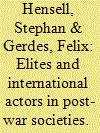

|
|
|
|
|
| Publication |
2012.
|
| Summary/Abstract |
This article analyses the efforts of external actors to influence opportunities for national political elites to gain or maintain positions of power in post-conflict societies. The analysis compares the cases of Liberia and Kosovo, both of which have been characterized by high levels of external intervention though with significant differences in the scope of authority of external actors. Despite these differences, similar dynamics have characterized elite formation in both countries. The impact of external actors on elite systems is mostly indirect, and chances for accumulating authority provided by the national setting determine elite careers. External actors bow to these national conditions rather than decisively changing them.
|
|
|
|
|
|
|
|
|
|
|
|
|
|
|
|
| 9 |
ID:
133959
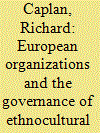

|
|
|
|
|
| Publication |
2014.
|
| Summary/Abstract |
The post-Cold War period to date has witnessed renewed international and especially European preoccupation with issues pertaining to ethnocultural diversity and the challenges for governance arising from these issues. This article discusses the shift that has occurred in support of national minority rights in Europe and why European organizations have become more concerned with these rights after the Cold War. It examines some of the major policy initiatives adopted by European organizations in response to the nearly 25-year long Yugoslav crisis and what these initiatives reveal about new (and old) thinking within these organizations with respect to national minority rights and the management of ethnocultural diversity more generally. It also discusses the consequences of these initiatives for minority rights protection and some of their broader implications for European policy in the future.
|
|
|
|
|
|
|
|
|
|
|
|
|
|
|
|
| 10 |
ID:
143795
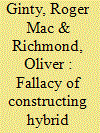

|
|
|
|
|
| Summary/Abstract |
This article reviews the recent academic and policy interest in hybridity and hybrid political orders in relation to peacebuilding. It is sceptical of the ability of international actors to manufacture with precision hybrid political orders, and argues that the shallow instrumentalization of hybridity is based on a misunderstanding of the concept. The article engages in conceptual-scoping in thinking through the emancipatory potential of hybridity. It differentiates between artificial and locally legitimate hybrid outcomes, and places the ‘hybrid turn' in the literature in the context of the continued evolution of the liberal peace as it struggles to come to terms with crises of access and legitimacy.
|
|
|
|
|
|
|
|
|
|
|
|
|
|
|
|
| 11 |
ID:
123388
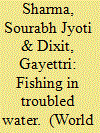

|
|
|
|
|
| Publication |
2013.
|
| Summary/Abstract |
Although there are positive signs of a big power playing an important and responsible role in a war ravaged country in its aftermath, China's foray in Afghanistan reflects that it is walking a diplomatic tightrope in Afghanistan. It is trying hard to maintain a silent but highly strategic presence in the country while at the same time managing its relations with other actors present in Afghanistan. However, as the date of US-NATO exit plan by the end of 2014 approaches; the politics between various domestic, regional, and international actors get surcharged.
|
|
|
|
|
|
|
|
|
|
|
|
|
|
|
|
| 12 |
ID:
133143
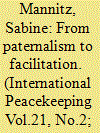

|
|
|
|
|
| Publication |
2014.
|
| Summary/Abstract |
This paper discusses the shortcomings of the established Security Sector Reform (SSR) concept and practice and argues for an overhaul of the ways in which transformations in security spaces are approached. In consideration of the theoretical and practical implications of the quest to involve local actors in SSR, a related research agenda is sketched and a case is made in particular for the inclusion of social anthropological perspectives to foster an empirically grounded evaluation of security governance interactions and transformations in context. This could be relevant to the search for strategies to support longer term facilitation processes and overcome the widespread paternalism in donor-recipient relations.
|
|
|
|
|
|
|
|
|
|
|
|
|
|
|
|
| 13 |
ID:
123993
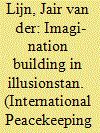

|
|
|
|
|
| Publication |
2013.
|
| Summary/Abstract |
A variety of international actors, such as the UN and NATO, intervene in complex environments, such as Afghanistan. In order to overcome complexity and for 'us' to deal with 'them', constructs such as 'the insurgents' and 'the government' are used to help 'our' understanding and to simplify the picture. Subsequently, these constructs become subject to nation building and counterinsurgency theories applied by the 'international community'. Many of these are suboptimal because their subjects were constructs in the first place. The result is a shadow boxing match, in which international policies dissolve in local realities. On the basis of social psychology theories, this paper develops the hypothesis that in complex peacebuilding environments decision-makers structure and simplify disorder, which leads to suboptimal interventions, to which local actors respond in a process of friction. This hypothesis is tested on the case of Afghanistan.
|
|
|
|
|
|
|
|
|
|
|
|
|
|
|
|
| 14 |
ID:
133842
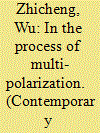

|
|
|
|
|
| Publication |
2014.
|
| Summary/Abstract |
The international system is the relatively stable framework of international relations constituted by various international actors, and represented by the great powers. The various international actors interact with one another in the framework. Therefore, against the current background of deepended globalization.
|
|
|
|
|
|
|
|
|
|
|
|
|
|
|
|
| 15 |
ID:
133992
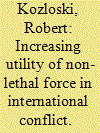

|
|
|
|
|
| Publication |
2014.
|
| Summary/Abstract |
Since the end of the Cold War, the United States has attained mixed results using the traditional instruments of power in pursuit of foreign policy objectives. In the future these instruments may prove even less effective because of domestic problems and changes in the geopolitical environment. Advanced military capabilities enabled by emerging technology may provide policymakers with broader options and greater utility when coercion is required in international relations. The application of non-lethal force is not a substitute for war but an effective lever to consider in future conflict. This article proposes several concepts: digital blockade, conflict termination, wide-area denial, and offshore control, which could be used during future state-level conflict. While these emerging capabilities offer great promise, they are not a panacea. Policymakers and military leaders must fully understand the conditions in which these capabilities provide maximum effectiveness, as well as overcoming legal barriers and contending with the problem of escalation.
|
|
|
|
|
|
|
|
|
|
|
|
|
|
|
|
| 16 |
ID:
139221
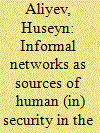

|
|
|
|
|
| Summary/Abstract |
In contrast to numerous studies on exogenous mechanisms of human security – such as the provision of human security by international actors – this study examines the role of informal networks in providing ‘freedoms from want’ and ‘freedoms from fear’ to the population. With the primary focus on post-communist South Caucasus (Armenia, Azerbaijan and Georgia) this article conducts a rigorous examination of informal networks’ critical function as sources of human (in)security since the breakup of the Soviet Union. Based on a combination of open-ended elite (expert) interviews, field observation and closed-ended survey data, this study demonstrates that apart from the informal networks’ crucial role in generating social capital and functioning as indispensable social safety nets, they also exacerbate human insecurity by cementing the traditions of clientelism and corruption that are deeply entrenched in the region.
|
|
|
|
|
|
|
|
|
|
|
|
|
|
|
|
| 17 |
ID:
097806
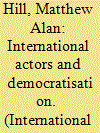

|
|
|
|
|
| Publication |
2010.
|
| Summary/Abstract |
Externally driven state-building is a complicated task that rarely fulfils the declared objectives of the international actors or the local state and society. This paper critiques the international dimension to state-building by examining USAID in Afghanistan and identifying the theoretical and practical explanations for its failure to aid democratic consolidation. Arguing that the Bush administration's democratisation efforts have had a negative impact on consolidating democracy, this paper identifies the democratic product of Afghanistan as characterised, at most, by having the formal institutions, routines and procedures of a democracy. I suggest that this merely 'formal' democratic product is too short-term and fails to take fully into account the need to develop a political and social culture capable of supporting democratic institutions. In terms of the future of democracy promotion in US foreign policy, I suggest that a change of emphasis may be occurring in the Obama administration.
|
|
|
|
|
|
|
|
|
|
|
|
|
|
|
|
| 18 |
ID:
133481
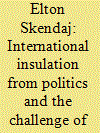

|
|
|
|
|
| Publication |
2014.
|
| Summary/Abstract |
Can international actors build effective state bureaucracies in postwar countries? While the literature on state institutions suggests they are best built under local ownership, this article shows how international actors in collaboration with local actors managed to build two effective state bureaucracies in postwar Kosovo: the police force and the customs service. Contrary to the article's Hypothesis 1 on local ownership, international actors insulated the effective bureaucracies from political and societal influences in order to prevent them from becoming sites of patronage. Thus, these institutions built on meritocratic recruitment and promotion. Employing a comparative research design, the article utilizes national survey data as well as data from 150 semistructured interviews conducted during ten months of fieldwork in Kosovo. By contrasting the state's constituent bureaucracies, which vary in effectiveness, and thus avoiding the reduction of the state to a unitary abstract actor, this research offers a fresh perspective on postwar state building. Furthermore, it contributes three innovative sets of indicators to measure effective bureaucracies: mission fulfillment, penalization of corruption, and responsiveness to the public.
|
|
|
|
|
|
|
|
|
|
|
|
|
|
|
|
| 19 |
ID:
133140
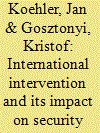

|
|
|
|
|
| Publication |
2014.
|
| Summary/Abstract |
The challenge of building a security sector effective in terms of protecting the population and the state from challengers, and which at the same time fulfils minimum standards of good governance, was a daunting one in Afghanistan. These difficulties were compounded by what in hindsight seem to be obvious mistakes on the part of the intervention. In our paper, we investigate how security sector building fared under such adverse conditions in north-east Afghanistan. We find that in spite of the formidable challenges and the mistakes made by the international intervention, it did not fail completely. Neither did it succeed. Based on the results of quantitative surveys and qualitative research, we suggest that (a) the international intervention was partly successful in building up Afghan National Security Forces - both as a fighting force and in terms of security sector institutions that are restrained to some extent by the rule of law; (b) the problems caused by setting up informal local militias (violent feuds, criminality, human rights abuses and extortion of the population) could be partly mitigated by transforming them into an official local police programme.
|
|
|
|
|
|
|
|
|
|
|
|
|
|
|
|
| 20 |
ID:
129208
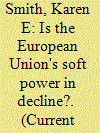

|
|
|
|
|
| Publication |
2014.
|
| Summary/Abstract |
Almost twenty-five years ago, the political scientist Joseph S. Nye Jr. coined the term "soft power" to capture the influence that the United States exercises not through coercion or inducement but through attraction. Coercion and inducement-the stick and the carrot-are forms of command power (or what Nye calls "hard power"), delivered via economic, diplomatic, or military instruments. Command power is used to compel or bribe others to do what you want them to do. Soft power, in contrast, is less a policy instrument to be wielded than an indirect force; it emanates from the attractiveness of a state's culture, political values, and foreign policies. Soft power encourages other international actors to cooperate with a state (or a multistate organization like the European Union) to pursue what they perceive as shared goals and values. It is therefore a less costly means of attaining desired outcomes than the use of command power.
|
|
|
|
|
|
|
|
|
|
|
|
|
|
|
|
|
|
|
|
|